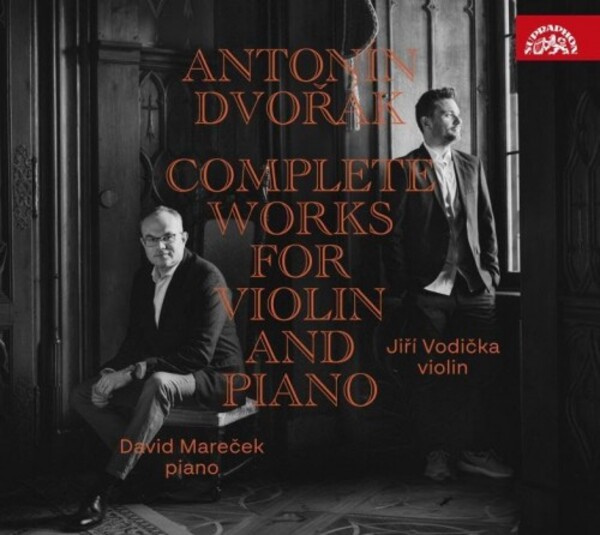DVOŘÁK Complete Works For Violin and Piano (Jirí Vodicka)
View record and artist detailsRecord and Artist Details
Genre:
Chamber
Label: Supraphon
Magazine Review Date: 11/2024
Media Format: CD or Download
Media Runtime: 102
Mastering:
DDD
Catalogue Number: SU4340-2

Tracks:
| Composition | Artist Credit |
|---|---|
| Sonata for Violin and Piano |
Antonín Dvořák, Composer
David Marecek, Piano Jiří Vodička, Violin |
| Romantic Pieces |
Antonín Dvořák, Composer
David Marecek, Piano Jiří Vodička, Violin |
| Sonatina for Violin and Piano |
Antonín Dvořák, Composer
David Marecek, Piano Jiří Vodička, Violin |
| Capriccio: Rondo di concert |
Antonín Dvořák, Composer
David Marecek, Piano Jiří Vodička, Violin |
| Romance |
Antonín Dvořák, Composer
David Marecek, Piano Jiří Vodička, Violin |
| Ballad |
Antonín Dvořák, Composer
David Marecek, Piano Jiří Vodička, Violin |
| Nocturne |
Antonín Dvořák, Composer
David Marecek, Piano Jiří Vodička, Violin |
| (16) Slavonic Dances, Movement: No. 2 in E minor |
Antonín Dvořák, Composer
David Marecek, Piano Jiří Vodička, Violin |
| (8) Humoresques, Movement: No. 7 in G flat |
Antonín Dvořák, Composer
David Marecek, Piano Jiří Vodička, Violin |
| Mazurek |
Antonín Dvořák, Composer
David Marecek, Piano Jiří Vodička, Violin |
Author: Charlotte Gardner
One tends to forget just how much violin-and-piano duo music there exists by Dvořák when you consider both the works that he wrote exclusively for this combination and those that either began life for other forces or that he published with multiple instrumentation options. The main works include the Violin Sonata in F, penned in 1880 in response to Brahms’s Sonata in G; the five Romantic Pieces, Op 75, he quickly reworked from his 1887 String Trio in C; and the Sonatina in G he wrote in 1893 as an amateur-friendly gift to his children (and ‘for mature grown-ups who can have fun with it in their own way’) in celebration of reaching his 100th opus. But there’s also a whole string of occasional pieces, from the virtuosic Capriccio – his first known work for the violin, published posthumously – to the dark Ballade in D minor commissioned by London journal The Magazine of Music for its 1884 Christmas supplement. In total, it adds up to almost one and three-quarter hours of incredibly stylistically varied music – and so far as I can tell, this ‘Complete Works’ from Czech Philharmonic concertmaster Jiří Vodička and David Mareček is the first recording to bring absolutely all of it together in one place, although their album’s greatest worth isn’t its comprehensiveness but the playing itself.
Take the way they voice the Brahmsian contours of the Sonata in F with a deftly symbiotic blend of the older German’s noble warmth and melancholic tension, and Dvořák’s own bright, pure, Czech tongue. Its Poco sostenuto is particularly superbly interpreted, its outer sections played with a softly Romantic, Brahms-aware glide and tonal depth – with the faintest Czech ring to the piano colours in particular – after which the Czech accent fully flowers out over the central sequential conversation’s phrasing and ornamentations.
Their Sonatina often sounds quite Mozartian in its coolly glowing, flowing purity, but also with a Larghetto of a lightly worn profundity whose punch thus catches you off-guard. Was this suddenly tear-flecked movement Dvořák’s gift not to his living children but to the three that died in the space of just a few months back in 1877, just before his career took off? That’s what Vodička and Mareček’s reading has had me wondering.
Space precludes too much further detail. However, I can’t not mention the wistfully lilting Romance, Op 11, premiered in 1877 by another concertmaster, Josef Markus of the orchestra of the Provisional Theatre in Prague. This has mostly been recorded in its orchestra-accompanied incarnation, and understandably, because the piano-accompanied version Simrock published alongside the orchestral was by Josef Zubatý, with Dvořák’s approval. Dvořák then later wrote one himself, but gifted it unpublished to the violin virtuoso František Ondříček – and it’s that version, rediscovered and published in 2015, that Vodička and Mareček give us in a reading of a degree of colour nuance and development, stylistic breadth and metrical freedom that I’m yet to hear from an orchestral one. Partly this will be down to the greater flexibility afforded by the duo forces, but not entirely.
Add the natural, unobtrusive acoustic of the Dvořák Hall of Prague’s Rudolfinum and informative notes from Jan Kachlík, and I can’t see anyone bettering this any time soon.
Discover the world's largest classical music catalogue with Presto Music.

Gramophone Digital Club
- Digital Edition
- Digital Archive
- Reviews Database
- Full website access
From £8.75 / month
Subscribe
Gramophone Full Club
- Print Edition
- Digital Edition
- Digital Archive
- Reviews Database
- Full website access
From £11.00 / month
Subscribe
If you are a library, university or other organisation that would be interested in an institutional subscription to Gramophone please click here for further information.




